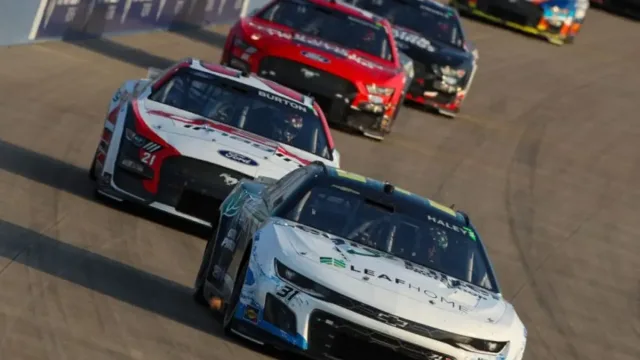Key Highlights
- NASCAR’s $7.7 billion deal sets a high benchmark for sports media contracts in the U.S.
- Formula 1 seeks a more profitable U.S. media deal following ESPN’s withdrawal and NASCAR’s success.
- The U.S. market is F1’s fastest-growing, intensified by ‘Drive to Survive’ and multiple races.
- Potential partnerships with streaming giants like Netflix and Amazon could revolutionize F1 broadcasting.
- F1’s future media strategy may involve innovative methods to expand audience reach and engagement.
The Importance of Broadcasting Rights and F1’s US Market Expansion
Broadcasting rights serve as the lifeblood of modern sports, driving both visibility and revenue for leagues around the globe. In motorsports, these rights are pivotal in propelling the sport into new markets and expanding its global reach.
Formula 1, with its storied legacy, recognizes the lucrative potential of the US market—a terrain rich with opportunity yet fiercely competitive. The attraction lies not only in increasing the sport’s viewership but also in cultivating a dedicated fan base across the Atlantic.
For Formula 1, securing a robust broadcasting agreement in the US is paramount to cementing its presence and capitalizing on the vast market potential. Such a deal would not only improve visibility but also release substantial revenue streams, further fueling the sport’s innovation and growth.

ESPN’s Withdrawal and NASCAR’s Blockbuster Deal
The recent withdrawal of ESPN from the bidding process for Formula 1‘s broadcasting rights has left a substantial void, challenging the sport to navigate its next steps strategically.
This unexpected departure emphasizes the complexities involved in securing lucrative media partnerships, particularly when financial demands are steep. Formula 1 now finds itself in a delicate position, tasked with the urgent need to find a broadcasting partner that matches its global prestige.
In contrast, NASCAR has successfully negotiated a historic $7.7 billion media deal, spanning from 2025 to 2031, with major networks NBC, Fox, Amazon, and WBD.
Bringing the best racing in the world to fans, wherever and however they may be watching. pic.twitter.com/YpUVhYQhSf
— NASCAR (@NASCAR) November 29, 2023
This agreement not only highlights NASCAR’s robust appeal within the United States but also sets a benchmark for sports media contracts. It exemplifies the potential windfalls of tactical partnerships, blending traditional and digital platforms.
As Formula 1 assesses its options, NASCAR’s success story offers both a challenge and a blueprint for achieving similar triumphs in the competitive broadcasting arena.

F1’s Efforts to Secure a Lucrative Deal
In the shifting landscape of sports broadcasting, Formula 1’s quest for a lucrative U.S. media deal is gaining momentum. The recent $7.7 billion NASCAR agreement has compelled Formula 1’s stakeholders to reassess their strategy, eyeing a more profitable arrangement than their current contract with ESPN.
Liberty Media, F1’s parent company, is actively pursuing a U.S. broadcast partner capable of generating substantial revenue, well above the estimated $85 million paid by ESPN.
The United States represents Formula 1’s fastest-growing market, driven by the success of the Netflix series ‘Drive to Survive’ and the inclusion of three U.S. races in Austin, Miami, and Las Vegas.
These factors have sparked increased interest from American companies and brands enthusiastic to engage with the sport. As F1 navigates this critical juncture, the industry watches closely to see which broadcasting giant will step forward to solidify its U.S. presence.
Potential Streaming Giants and the Future of F1 Broadcasting
In the midst of the rapidly evolving landscape of sports broadcasting, Formula 1 finds itself at a pivotal crossroads regarding its future in the U.S. media market. The termination of its exclusive deal with ESPN opens a domain of opportunities for F1 to engage with a more expansive audience.
This potential shift invites speculation about possible partnerships with streaming giants like Netflix and Amazon. Both platforms present unique advantages: Netflix, already influential through its ‘Drive to Survive’ series, has reportedly shown interest in acquiring F1’s broadcasting rights.
“(F1 is likely) talking about not only the fact that I’m bringing in 1.3-1.4 million [viewers] consistently week in, week out, but I also give them global reach as a sport, which is unique to Formula 1 versus other motorsports – NASCAR, IndyCar – in this marketplace. It’s also the best in my opinion motorsport property to work with if you’re trying to attract high-end, high-value brands to your platform or network.” Dan Cohen, executive vice president of media rights advisory at Octagon
Meanwhile, Amazon continues to enhance its sports portfolio, potentially positioning F1 as its marquee offering. Each contender brings the promise of a groundbreaking viewing experience for U.S. fans, potentially revolutionizing how motorsport is consumed.
As Formula 1 contemplates these partnerships, the sport is poised to redefine its presence, leveraging the global reach and high-value appeal noted by experts in the field.

News in Brief: NASCAR’s 7.7Bn Dollars Deal Puts Pressure on Formula 1
The recent $7.7 billion broadcasting deal by NASCAR highlights the critical importance of media rights in motorsports, intensifying the pressure on Formula 1 to secure an equally impactful agreement in the U.S. market.
With ESPN stepping back, F1 is actively exploring partnerships with major streaming platforms to improve its American presence. This tactical move aims to capitalize on the growing popularity of F1 in the U.S., ensuring robust and groundbreaking coverage for its expanding fan base.
ALSO READ: Insider Slams NASCAR’s Final-Lap Call That Robbed Fans of Epic Three-Wide Finish
